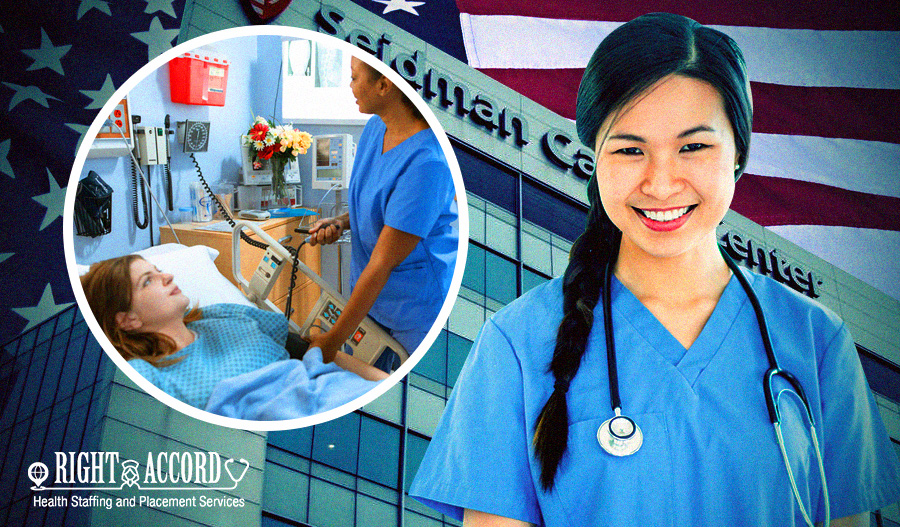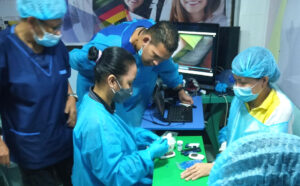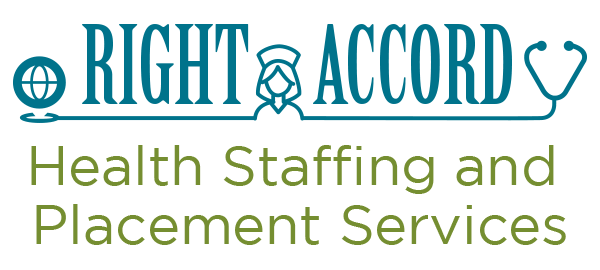How to Work as Foreign-Educated Nurse in USA

Introduction
Nurses are crucial to the healthcare system and this has been further confirmed by the recent pandemic. The need for nurses is not letting up and countries like the US are looking to international nurses to amplify their nursing workforce.
Nursing Shortage: A Global Crisis
The demand for healthcare has increased steadily and so does the demand for nurses. Certain factors have always been known to cause the shortage of nurses in America and all over the world. The rising need for care of the aging population, older nurses nearing retirement, decreased trained nurses and educators, as well as, a high turnover rate have all contributed to a great clamor for nurses.
The recent pandemic has not only made this demand worse but has been predicted to reduce nurse retention. COVID-19 has made nurses ill, burned out, and greatly affecting mortality rates, making the nursing shortage even worse.
Up to 13 million nurses will be required over the next decade as forecasted by the International Council of Nurses (ICN) in their report, Sustain and Retain in 2022 and Beyond. ICN has recommended stabilizing and building the nursing workforce by providing safe work environments, support with staffing and workloads, increased involvement in decision-making, provision of mental health services, and equitable compensation.

Now is the Time to Fulfill your American Dream
The Commission on Graduates of Foreign Nursing Schools (CGFNS) reported that they have received over 17,000 VisaScreen® Service (VS) applications from 116 countries, which is a 44% increase from 2021 and a 109% increase from 2018.
Policies are now being put into place to encourage nursing retention and amplify the nursing workforce. Countries such as the US have major economic advantages that will bring more opportunities for aspiring nurses to have better working conditions, hours, and compensation.
Overview of Foreign-Educated Nurse Requirements
Before securing a work visa as a US licensed nurse, a foreign-educated nurse must follow a 2-step process. The first step includes prescreening from CGFNS and taking an English Proficiency exam. The second step involves passing the National Council Licensure Examination for Registered Nurses (NCLEX-RN) and meeting additional state requirements.
What You Need to Become a Foreign-Educated Nurse in the US
- Certification as a graduate of a nursing program in your country.
- A licensed nurse prior to applying as a nurse in the US.
- Practiced as a registered nurse for at least 2 years.
- Proven English proficiency as evaluated by the following:
- Test of English as a Foreign Language (TOEFL)
- Test of English for International Communication (TOEIC) or
- International English Language Testing System (IELTS Academic)
- Have your credentials approved by the CGFNS.
- Taken and passed the NCLEX-RN.
- Work with a reputable Staffing and Placement Agency to obtain your work visa.
It’s important to find a trustworthy agency that will help you fulfill your dreams and be committed to making your life as a professional nurse as easy and rewarding as possible.
Bonus tip: choosing one that is nurse-owned will guarantee that the agency will truly understand your needs as an aspiring US registered nurse.
Preparing to Take the NCLEX-RN Exam
Beginning April 2023, the Next Generation NCLEX (NGN) will be using new types of questions based on “real-world case studies” to evaluate each nurse’s critical thinking and decision-making skills.
NCLEX is the world’s premier licensure exam and it uses state-of-the-art computerized adaptive testing (CAT) technology to measure the competence of aspiring US nurses.
Tips to Ace the NGN
- Be ready – Visit www.nclex.com for updates about the exam content.
- Practice – Download some of the sample questions and situations on the NCLEX website and answer them as you prepare to take the exam.
- Think Positive – Remember your goals and the efforts you’ve done to make them happen. Breathe. You got this.

Common Challenges of the Overseas Nurse
Armed with professional competence and years of experience, foreign-educated nurses are great assets to the healthcare team as they bring a variety of skills and knowledge to their areas of practice.
However, like any American immigrant, overseas nurses face some cultural challenges in adapting to their workplace.
Communication Barrier
English proficiency is a requirement to be a licensed nurse in the US, however, many foreign-educated nurses are unfamiliar with the local slang and jargon in the workplace.
Different Nursing Practices
Many international nurses have several years of experience before deciding to move to the US and may be overwhelmed by the technology used, as well as, changes in the workplace system.
Adjusting to Cultural Values
A good example of adapting to contradicting cultural values is the Asian deference to elders versus the American preference for assertiveness. Migrant Asian nurses tend to initially struggle with elderly care because they are raised to treat elders as authority figures, which may hinder the provision of care.
Helping International Nurses Adapt
Receiving support from their peers and teammates will result in their faster acclimation to their environment and a smoother transition for them as capable members of the team.
Beginning with introductions to the entire team members, explaining the workplace routine, and providing positive feedback will encourage international nurses to be more confident in their new roles.
Foreign-educated nurses may take some time to fully adapt to the American culture, but successfully adapting to their environment will result in work satisfaction for both the international nurse and the healthcare team members.
A Closer Look at International Nurses in the US
The International Centre on Nurse Migration (ICNM) reported that 1 out of 8 nurses globally are foreign-educated nurses. Employing nurses from overseas has positively impacted the nurse-to-patient resource balance, ensuring that US healthcare teams maintain the provision of high-quality care to their patients.
A survey of International Nurses published some interesting details about foreign-educated nurses in the US that will allow us to understand them better.
Top 4 Countries of Origin
- Philippines
- Jamaica
- India
- Multiple countries in Africa
Professional Competence and Experience
- 90% of international nurses who answered the survey said they have completed a 4-year Bachelor of Science in Nursing degree.
- 12% of the respondents hold a Master of Science in Nursing.
- 1% of the degree holders obtained a Doctor of Nursing Practice degree.
- 89% of the respondents have over 10 years of nursing experience.
Job Satisfaction
- 79% of the international nurses who responded said they were somewhat to very satisfied with their jobs in the US.
- 81% said they would choose to work in the US again.
- A vast majority of international nurses are very satisfied in terms of pay, hours, and work conditions in the US.
Conclusion
The US needs foreign-educated nurses to maintain high-quality healthcare and the country is ready to provide better working conditions, hours, and compensation to meet the worldwide nursing demand. The challenge to international nurses is to adapt to the American environment but with their professional competence, skills and experience, along with the support from their peers, job satisfaction and success will continue to be within their reach.
If you are an aspiring US registered nurse, visit the RIGHT ACCORD Health Staffing and Placement Services website to learn more about how we can start fulfilling your professional dreams today.
 About the Author
About the Author
Rosemarie Tamunday Casanova, RN, BSN, MHA – CEO
I have been a nurse for over three decades and have worked in various settings, including long-term care facilities, teaching hospitals, and trauma centers. Over the years, I have held several critical care positions and even earned a master’s degree in Health Administration. My journey in entrepreneurship began in 2000 when I co-founded a staffing and recruitment agency with my partner, Health and Technology Professionals.
After relocating to Florida, I established my own Home Care Agency and have been operating it successfully for over a decade. Despite our success, I have always been aware of the ongoing need for registered nurses in the US. This led us to reignite our recruitment services and assist international registered nurses in finding employment in the US.
